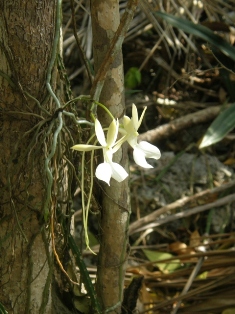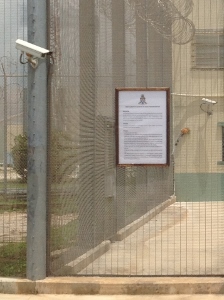Archive for January 17th, 2014

Cayman faces serious environment risks
 (CNS): A new report by the UK’s Environmental Audit Committee on sustainability in the overseas territories has raised a litany of serious environmental risks in Cayman, which was one of the territories it visited during the course of compiling the report. Taking the British government to task over its failure to ensure sufficient guardianship of the environment in its territories, the report raises concerns about the Cayman Turtle Farm, waste management problems, uncontrolled development and the failure to use the Environmental Protection Fund in Cayman. The report also found that inadequate development controls and no statutory requirements for EIA’s are threatening the islands.
(CNS): A new report by the UK’s Environmental Audit Committee on sustainability in the overseas territories has raised a litany of serious environmental risks in Cayman, which was one of the territories it visited during the course of compiling the report. Taking the British government to task over its failure to ensure sufficient guardianship of the environment in its territories, the report raises concerns about the Cayman Turtle Farm, waste management problems, uncontrolled development and the failure to use the Environmental Protection Fund in Cayman. The report also found that inadequate development controls and no statutory requirements for EIA’s are threatening the islands.
The in-depth report covers all of the UK’s territories and raises a significant number of issues relating to myriad environmental problems. However, Cayman features heavily in the report as it was one of the case studies.
As an example of the dangers of uncontrolled development, the report highlights a situation in Little Cayman of developers clearing land in preparation for a significant sub-division, which has caused concern for residents but seems to be flying under the radar regarding local activists.
“We identified a pertinent example how inadequate development controls impact the environment when we visited the Cayman Islands,” the report states.
Pointing to the lack of a development plan for Cayman Brac and Little Cayman and minimal planning controls, the committee said that a British company, Crown Acquisitions, had purchased land on all three Cayman Islands, which it has subdivided into undeveloped plots.
“Crown Acquisitions told us that it owns approximately 200 residential plots with planning permission on Little Cayman,” the report said. However, CNS understands that Crown Acquisitions has not, in fact, made a single planning application on the Sister Islands.
The authors went on to explain that given the size of Little Cayman and its healthy marine environment, as well as it being home to the largest red-footed booby population in the Caribbean, and the fact that Crown Acquisitions told the committee “that it had not assessed the impact of its proposed development on Little Cayman's infrastructure,” there was significant concern about the development and the impact on the islands’ unique environments.
“Although they are acting within the current development framework, developers are risking the biodiversity and ecological sustainability of the Cayman Islands. That is the direct consequence of inadequate development controls and lack of comprehensive governance arrangements,” the committee warned.
The audit committee berates the Foreign and Commonwealth Office for not meeting its constitutional responsibility to ensure that good governance arrangements in the UK's overseas territories include sustainable development, effective development controls and statutory environmental impact assessments for major developments and strategic infrastructure plans. It presses the office to direct governors to advocate strongly for the introduction of effective development controls.
The report describes the UK Government as having “constitutionally subcontracted environmental management” directly to the territories but the committee found that this does not devolve away the UK's ultimate responsibility under international law.
“The overseas territories are plainly not independent sovereign States. Their external relations remain the responsibility of the United Kingdom, the sovereign power. Accordingly, the United Kingdom is responsible for each of the territories under international law,” the report states.
With more than 500 globally threatened species in the territories and undisturbed habitats of international significance, the UK government has acknowledged the importance and sensitivity of the rich biodiversity among them but the committee accused the FCO of abdicating its responsibility.
“During our inquiry, the UK Government expressed general but unspecified aspirations to 'cherish' the environment in the overseas territories, but it was unwilling to acknowledge or to address its responsibilities under United Nations treaties. This was disappointing, because the environment in the Overseas Territories is globally significant and comprises 90% of the biodiversity for which the UK Government has responsibility,” the report said
In Cayman alone the report points to a litany of environmental problems and while it welcomed the introduction of the National Conservation Law, it had significant concerns about waste management practices in the Cayman Islands.
“We saw old refrigerators being crushed with no regard to CFCs and recycling that ranged from minimal to non-existent,” the report reads. “The waste management site on Grand Cayman appeared to be inadequately lined and waste may be seeping into the water table.The facilities on Cayman Brac and Little Cayman were even less convincing. The facility on Little Cayman was lined, but the lining had been fractured by the unregulated burning of rubbish. The facility on Cayman Brac was unlined and waste appeared to be seeping into a nearby lake
“Local authorities in the UK have the expertise to address those issues. Cayman Islands Government and the UK Government might wish to consider developing a partnership with a UK local authority to share best practice,” the report.
Pointing to Cayman’s Environment Protection Fund, which is currently worth more than £40 million, none of which has been used for environmental protection, the committee said the UK Government could have persuaded the Cayman Islands Government to use it for its intended purpose.
“If the fund were used for its intended purpose, it would allow UK funding for environmental protection, such as Darwin Plus, to be directed to other UKOTs which have more limited resources than the Cayman Islands and which do not have access to their own environment funds,” they wrote.
However, pressure from the FCO regarding Cayman’s finances had led to the government keeping hold of the $40 million to boost its reserves.
“The UK Government is prepared to exercise hard and soft power in relation to financial matters in the UKOTs, but it is apparently not prepared to exercise those powers to protect biodiversity and to promote environmental sustainability," the report found, as it pointed to a long list of recommendations about dealing with the OT’s environment issues.
Check back to CNS regarding the report’s findings on the Turtle Farm.

CJ finds bail law lines up with human rights
 (CNS): A murder suspect who has been in jail on remand for almost 18 months has failed in his bid to have the bail law declared incompatible with the Bill of Rights and the Constitution. In a ruling delivered on Christmas Eve following a judicial review that was heard in September, Chief Justice Anthony Smellie found that the law did not clash with a person’s rights to liberty enshrined in the constitution. Brian Borden, who is due to stand trial on Monday for the murder of Robert Mackford Bush, had argued via his attorney, Nick Hoffman, that the bail law was disproportionate because of the presumptive denial of bail for murder suspects, and many others under Cayman Islands Law, claiming it breached human rights.
(CNS): A murder suspect who has been in jail on remand for almost 18 months has failed in his bid to have the bail law declared incompatible with the Bill of Rights and the Constitution. In a ruling delivered on Christmas Eve following a judicial review that was heard in September, Chief Justice Anthony Smellie found that the law did not clash with a person’s rights to liberty enshrined in the constitution. Brian Borden, who is due to stand trial on Monday for the murder of Robert Mackford Bush, had argued via his attorney, Nick Hoffman, that the bail law was disproportionate because of the presumptive denial of bail for murder suspects, and many others under Cayman Islands Law, claiming it breached human rights.
While the law does remove the entitlement to bail of people charged with a long list of offences it does not prevent them from applying and demonstrating why they should not be held on remand.
The Chief Justice Anthony Smellie, dismissed the application and said that, “notwithstanding the purported disentitlement to bail expressed in section 17(2),” it should “appropriately be read down to make it compliant with the Bill of Rights requirement of prompt and continuing judicial oversight, when the court will be entitled to account of all relevant considerations pointing for and against the grant of bail for any of the listed offenses.”
He added that any lack of clarity or ambiguity was neither disproportionate nor arbitrary and
“not incompatible with the Bill of Rights.”
Given that the hearing and subsequent ruling came relatively late in the day for Borden who will begin his trial on 20 January the case has implications for other inmates held on remand for murder or various other serious offences.
Although the law does not mandate that murder suspects must be on remand it is almost unheard of for the courts to release anyone on bail who is charged with killing another individual. Regardless of the standard of evidence or circumstances surrounding the case or the allegation, in each and every bail application the crown simply argues that the mandatory penalty of a whole life sentence for any person convicted of murder here makes them a significant flight risk and the courts rarely if ever disagree.
Hoffman had argued that the bail law denied certain defendants the right to be considered innocent until proven guilty. By listing offences where bail should be denied until the defendant could prove why they should be let out, the law was disproportionate because it already sets out the reasons why people should be denied bail in the interests of justice regardless of the crime.
When people apply for bail the crown can argue legitimately that someone should not be bailed for various reasons whatever offence they have been accused of they can point to overwhelming evidence, a genuine flight risk of a foreign national, the danger they will commit another crime or interfere with witnesses among other statutory reasons. Hoffman submitted that there was no need for the law to add to that list with specific offences which was essentially overkill.

Experts rating CI road safety
 (CNS): A group of international road engineering safety experts are currently in the Cayman Islands conducting an assessment of the country’s 238 miles of road in order to measure the risk factors on the network and offer ways to mitigate potential hazards. Cayman has a very high road crash rate for the size of the country, double the World Health Organisation’s average with 16.5 people per 100,000 being killed on our roads annually. While many factors contribute to road crashes, experts from the International Road Assessment Programme (iRAP), which is partnering with the NRA on this project, say the only one that governments can manage is the road itself.
(CNS): A group of international road engineering safety experts are currently in the Cayman Islands conducting an assessment of the country’s 238 miles of road in order to measure the risk factors on the network and offer ways to mitigate potential hazards. Cayman has a very high road crash rate for the size of the country, double the World Health Organisation’s average with 16.5 people per 100,000 being killed on our roads annually. While many factors contribute to road crashes, experts from the International Road Assessment Programme (iRAP), which is partnering with the NRA on this project, say the only one that governments can manage is the road itself.
The experts say that things as simple as better road markings, sidewalks and intersection design can significantly lower the risk to all road users, including pedestrians, cyclists as well as drivers.
The National Roads Authority is using part of its roads budget for this financial year to pay for the assessment, which is costing around US$155,000 and will result in a full report on all the local roads and grade each one on a star rating — five star roads are the safest and 1 star the highest risk. With the help of the iRAP, local officials say they hope to upgrade all of the roads rated below three stars.
While road improvements cannot stop drunk drivers, people texting at the wheel, speeding or poor standards of driving and road awareness, or any of the other variable that may cause smashes, better engineered roads can be more forgiving, experts said at a press briefing Thursday. In other words, better designed and engineered roads can reduce the likelihood of accidents but when collisions still occur, as they will, those involved are less likely to be killed.
Kurt Tibbetts, who is now the minister in charge of roads, explained that the works ministry had been keen to undertake the assessment because of the number of fatal smashes on Cayman’s roads and the emergence of some specific places where crashes were happening more frequently.
“It was felt to be in the country's best interest to do a road assessment in order to determine what actions needed to be taken to mitigate accidents at specific locations,” Tibbetts said Thursday as he pointed to the grief suffered by families when they lose loved ones on the roads, as well as the medical expenses for those badly hurt and the loss of productivity to the country and earnings to families.
He explained that iRAP would not only assess the roads but also pass on expertise to the NRA team, offer technology advances, cost effective solutions and tracking on the road network performance when enhancements are in place. The minister said that some changes could be very cheap and simple but still save lives, as he noted that at present some 50 countries are engaged in a similar exercise with iRAP.
Using a special vehicle equipped with specialist gizmos and techy equipment, the NRA and iRAP have already begun taking the measurements. Once completed, a report and star rating will be given on all roads and the non-profit organization will then offer recommendations and solutions, which Tibbetts said would be implemented by CIG as money became available.
The iRAP focuses on 30 design features that influence crashes and the severity of crashes.
The experts said they had already spotted issues in Cayman relating to a lack of sidewalks and delineation on some of the roads as well as light pole spacing on fast roads.
Acting NRA Director Edward Howard said he was delighted that the ministry was supporting the initiative as it would give the authority a comprehensive safety measure of all the roads. The end goal was to ensure high risk roads were eliminated, he added.
Howard explained the assessment was part of the so called ‘4Es’ relating to road safety (education, engineering, enforcement and emergency management) and this was the engineering part.